Uncle Bill and World War II - Another "Radar" from MASH
Editor's Note: When you see these three dots surrounded by a gray rectangle — 1 — you can click on it to get further information about the topic. Click a second time, and the message goes away.
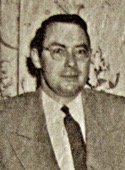
NOTE: My mother's brother, my Uncle Bill, participated in many of the major battles of the European theatre during World War II. This page and others reveal his experiences. For a full listing, see the bottom of this page. The photo at left is one of the rare photos I have of my uncle. It was taken after the war.
Corporal "Radar" O'Reilly
Reading my uncle’s descriptions of his war experiences, I knew he had suffered a great deal. But I was often amused by his stories of scrounging for things — just like "Radar" O'Reilly in MASH.
The character of Radar... comes from a small town in Iowa. Radar acquired his nickname because he was seemingly endowed with ESP, appearing at his CO's side before being called, anticipating his needs and even finishing his sentences. He also had super-human hearing, as he was able to hear incoming helicopters before anyone else could.
Radar was always the guy to go to when you needed supplies or something that wasn't easy to find. He knew how to skip the "channels" and find whatever was needed. My uncle seemed to have similar skills.
The Scounger
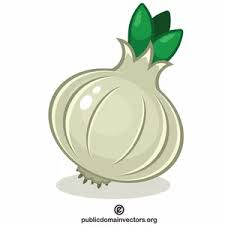
“I’d become the scrounger. I traded anything I had for anything to drink or eat. We particularly liked eggs, butter, potatoes, and onions. We could mix this with our C rations and make a fairly good meal. The pots and pans I’d picked up after Mortain improved our own little kitchen. Our preference in liquor was cognac, then wine. I imagine we drank some good wine but at the time it was just enough to know it was wet and had an alcoholic content.
“The ground never got soft or comfortable. It was always cold and damp and there was never any way to really keep dry in a rainstorm."
Pot-Bellied Stoves: Something a Nebraska Farm Boy knows all About
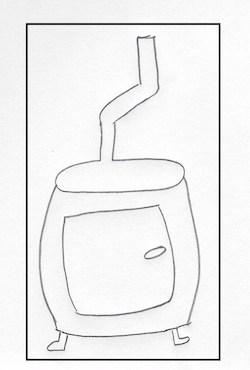
“In a bombed out building I found a pot-bellied stove. I think maybe I was the only midwestern boy in the battalion, and I knew about potbellied stoves. Grandpa … had them in the farm house .… The battalion was an old national guard battalion in southern California. It had many undergraduates from USC and UCLA. They didn’t know anything about pot bellied stoves, but I did. It was nice to have one. Since the personnel section had a ¾ truck to carry typewriters, army regulation books, etc., we would carry the pot bellied stove and some wood.
“But when the Colonel saw the stove he got most irritated. He didn’t believe in stealing, or looting as some soldiers did. I didn’t steal this stove. It was in a bombed out building.
“Then here came the Colonel. I gave him a cup of coffee. I gave him a cup of soup. He never said anything about the pot bellied stove. He stood by the stove with Captain Black of Headquarters Battery just like he’d found the thing and dug it out of a cellar. He told Captain Black that soon A Battery would leave, then ½ hour later B Battery, then C Battery, then ¼ of Headquarters Battery with Service Battery. That meant just a few of us would be last. I certainly hoped the Germans were busy further south."
Moving on....and more scrounging!
“We finally left at 4 a.m. in pitch black darkness. Everybody had on every piece of clothing they could and then wrapped up in blankets. Can you imagine! The army forgot to put heaters in those vehicles. We had blankets and duffle bags around our feet, had blankets around our heads. I sat in the back of Major Stewart’s command car, the forward half of a Bazooka team. It was a long cold day and I kept wondering, “Where will I sleep tonight?” I kept hoping that darkness would come and we’d sleep in a Belgium village or at an intersection where there were sometimes three or four farmhouses. No such luck. We kept going.
“Late in the afternoon we crossed a bridge over a river as this bridge was being prepared for demolition. We’d been given to understand that was the final retreat so we knew we were near our destination. We moved up the valley around the river and got up to open, semi-wooded ground. There were a couple of our guns. We knew we were close. I could see those cannoneers were going to sleep…if they slept…on the open snowy ground. I kept looking for a friendly ditch. Then we saw our vehicles parked near a white stone building. Oh, could I be lucky enough to sleep in there."
A Place to Sleep and more Stoves!
“We pulled off the road. Somebody came running from that stone building. Major Stewart thought it was a runner for him so he got out of the Command Car. When the runner got near, his call was for me. I left my Bazooka, took my carbine, and ran after the runner. We found the Colonel at the stone building. He hurried me inside, took me to a room and said, “Sergeant, can you put that pot bellied stove in here?” Oh, boy, I knew where I was going to sleep tonight. It was a stone wall but we thought we could get a hole through. We had a pick, an axe, a saw, and a supply of tiny thin wood, then bigger wood, then big wood. We got the stove up and burning.
“Then the Colonel said, ‘Sergeant, come with me.’ He had the Personnel truck and about four machine gun jeeps all lined up and he said, 'Go back to those houses near the river. Don’t cross the river. Stay this side but get three more pot bellied stoves.' It crossed my mind I should ask him if I should wait until they were out but somehow reason prevailed and I didn’t. I should mention we had cut up blankets and made big gloves so we could handle our pot bellied stove when it was hot.
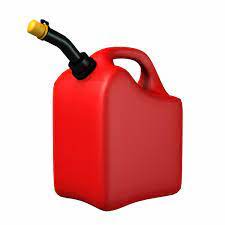
“I took three bead-ons of gasoline…that’s what the Belgians wanted … and in the next hour we made some quick trades. I traded a five gallon bead-on of gasoline for a pot bellied stove and wood from the wood pile. As I remember it, the Belgians didn’t think it was a fair trade but I think they were glad to see American soldiers coming in. We really didn’t discuss this."
And then they collected wood!
“A few days later when we were at a different place the Personnel Section was ordered to help load two big trucks with wood for the gun batteries. I knew there was a big wooded area down near the river and that there were lots of fallen trees in there so that’s where we went, and it didn’t take long to fill those trucks with dry, seasoned logs, but when we got back to the Belgian houses where we were staying the Belgians protested. That was the King’s Forest. No one should disturb the King’s Forest and particularly no one should take any wood from the King’s Forest. Since the King fled to England at the start of the war, we took a dim view of this. We needed the wood. We took the wood.
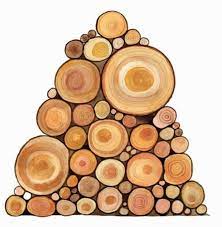
“The next day the Personnel Section was again ordered to help load two big trucks with wood. The Belgians saw us getting ready. I saw them get a cart, hitch up a horse, and thought that they were going down to the wooded area and try to stop us. I thought, what will I do. What kind of incident will we have. We were loading wood into their cart, but they didn’t try to stop us. Instead, they started loading wood for themselves. We really got to laughing. I guess as long as everybody was going to steal the wood from the King’s Forest that they’d steal some too."
Playing Hookey
“As we waited for our convoy to form Major Stewart told the three of us riding with him that we would make a slight detour. We always brought up the rear, waiting for the last truck or gun or jeep, in case someone had motor trouble, or got stuck, so Major Stewart showed us on his map how we’d cut loose up to Spa, Belgium, which was First Army Headquarters, and get a hot lunch. This was a bit risky for Major Stewart but I think everybody thought, who cares? What can anybody do to us…just so we timed it right and caught up to our convoy by late afternoon.
“So we played hookey and went to Spa, Belgium. The First Army was celebrating the Battle of the Bulge, everybody has fresh, clean uniforms. We were filthy dirty, unshaven, our great coats, our shoes, our pants, covered with mud. The Sergeant’s mess was celebrating with beer and steaks for lunch. I can tell you the troops that fought the Battle of the Bulge weren’t getting beer, and steaks, and apple pie. They were getting cold C rations and going back to the worst spot of the war. I went back to the Lt. in charge of two German prisoners passing out the beer and got a second round.
“When we got back to our Command Car two MPs gave us hell. What were we doing parking such a dirty vehicle in this reserve parking lot [they wanted to know]? We pulled it out and had about 15-20 minutes to wait for Major Stewart. We drove it around a few blocks and there was a bar. Of course it said, 'Off Limits' but we really didn’t care. The MP’s would have a warm room, clean beds, and hot food. We thought up a story that we had dysentery and needed a bathroom and I would try to buy some liquor with cigarettes. We didn’t have any money.
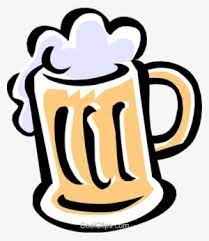
“We walked into that bar and the owner tried to shove us right out. We called out, 'Toilette, toilette' and there were three foreign correspondents in the bar, one of whom spoke French, and they told us the bathroom was downstairs. I tried to buy some liquor. No luck. The oldest of the war correspondents said, 'Let’s see your patch.' The patch was always on the left shoulder. I showed them my VII Corps patch. The older war correspondent said, “My god, VII Corps. We had a briefing this morning. The best fighting units of the VII Corps that fought in the Battle of the Bulge are going directly back to Hurtgen Forest today. No wonder you don’t worry about MPs.”
“So he bought us a round of drinks."
The Trader of Goods
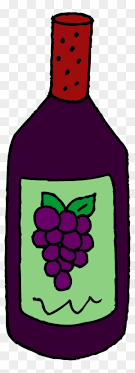
“I went to the bathroom and when I came back up there were two bottles of liquor on the table. The war correspondents said, 'Take it and get out of here and good luck.' I put the bottles on the inside pockets of the great coat and got out. We picked up Major Stewart and started for the Hurtgen Forest. When we got out of Spa, Major Stewart reached into his musette bag and pulled out a bottle of liquor. He said First Army was celebrating the end of the Battle of the Bulge and all liquor in the Officers’ Bar was free. The officers in charge of the bar gave Major Stewart a bottle because it was apparent that only one officer in that bar really fought in the battle. I wonder how many more bottles were in that bag. Major Stewart was pretty smooth in everything."
Getting Back to the Unit
“We finished the bottle together and then had a flat tire on the trailer we were pulling. It was a real effort…quite an effort…to change that flat tire. It was cold and we were a bit unsteady, so we fell behind on our schedule to catch our convoy. When we came to the first MP in a deep foxhole, it was apparent we were far behind. The MP said, turn around, no vehicles beyond this point. Major Stewart inquired about a convoy of Long Toms. The MP had just come on duty so knew nothing. He said there was one more MP about a ¼ mile farther but don’t pass that MP.
“We went up to the next MP. He was deep in his waist-high foxhole, too. Yes, a convoy of Long Toms had passed his way and the Colonel in charge had disobeyed orders and gone straight ahead. Major Stewart reviewed his map with this MP and then said, 'We have to go too.' We rounded a bend, Major Stewart thought he saw open fields on the left through some woods and so we went left, off the main road, onto a small road leading through the woods. Then came the mortar fire. We’d turned wrong. The driver turned right off the tiny road and got us into the woods. We walked ahead and made a decision that if we could keep going right through the woods that we’d get back to the main paved road.
“It was getting dusk. Major Stewart told the driver over and over how we’d move just at the last streak of light, hit that paved road, turn right, turn on the lights and run. Don’t get stuck. Don’t overturn the trailer. I could have used another drink about then.
“Came the time, just the last streaks of light in the sky, and here we go…….down a small ditch, up the slope of the road to the paved part, and just as we came out of that shallow ditch, there across the road, were the guns. We slid in under one of them. Major Stewart told me to find the Colonel and report in. It was dark now. I finally found the Colonel and he sent us to the rear, told us to walk to that Command Car in the morning just before dawn. We went back four or five miles, found a bombed out building, got into the basement area and I brought out one of my bottles from the bar in Spa. Next morning we walked that car back to the guns."
Back to War
“What a scene of desolation. That forest area had been shot up with hundreds of shells. I never did find out who had been in that forest area when the shells came in, German or American, but I wouldn’t have wanted to be there, and wondered if it would happen again with us there. All our troops were packed in under fallen trees, getting what protection there was."
Always Seeking Comfort Food and Lodging
"Our kitchen was just getting ready to heat hot water and I walked over there. I found that Lt. Marback was looking for me. He pointed out to me a small log hut about two blocks away. He said it was occupied by four infantry sergeants who were moving out today and they were selling it to any listed man for liquor. He gave me a bottle of liquor and said, 'See if you can buy it and then let me sleep there too.'"
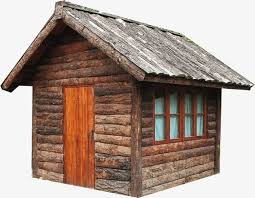
“I went over to the little log hut and woke the four infantry guys in there and offered my bottle of liquor. They claimed they already had an offer of two bottles. I told them I’d like fifteen minutes to see if I could do better. I knew I had a bottle left in my great coat but I didn’t know how long we would stay in this desolate place…I didn’t want to give up my liquor for a one-night stand…and also, would the colonel take over if I were successful. I went back to Lt. Marback. He thought we would stay. Right after breakfast everybody was to clear a way into the forest for an opening about a half mile in for the guns. It was going to be a big project to move fallen trees, but we had the equipment for that. Would the Colonel take our hut? No, he had a good spot with Major Stewart near Fire Control and Lt. Marback said he was betting on me to buy that little log hut.
"I went to ... the Personnel Officer. Did he have a bottle of liquor he could loan to me, or give to me for a spot in that hut if I could buy it? No, he had no liquor, but [the sergeant] might. [He] had an uncle who would buy a can of orange juice, make two holes in the top and pour out the orange juice and then fill up the can with liquor, then re-solder the two holes. Not a bad idea.
“So [we went looking for more help]. Could we push the transaction by inviting the four infantry sgt. to have breakfast coffee with us and a hot can of C rations, not a cold can? And, the Colonel had ordered all our kitchens to have pancakes. Could we invite them for pancakes? Yes we could. So [we] offered our three bottles of whiskey and insisted on an immediate possession if we took them into our kitchen area and gave them pancakes. This worked. We then got the medics to de-louse the hut and we moved in. I imagine we stayed about three weeks. It was a good buy, best house deal I ever did. Utilities were dirt cheap….no water bill, no light bill, no fuel bill. No maid service either.
“One day the Colonel said we’d have a two-man move team for the battalion. Personnel section had to find some place for movies. We found an about-to-fall-down barn near the back edge of the forest. We patched a few holes, cleared out the straw and junk on the floor and had movies…the same one, over and over, “Three girls and a sailor.” We had a problem with other troops units wanting to see a movie too so we worked out two lines and kept the movie people another few days. They didn’t like this but we did."
Goose Dinner!
“One night we had a most marvellous goose dinner on Thanksgiving Day Eve in a one star Michilin restaurant which was in the hotel. We kept looking around the room of this beautifully panelled room and the Germans in their suits and ladies in nice dresses and wondered if we had been almost face-to-face enemies at one time. We had the same thought the next night at the opera. We had a drink in the lovely bar. Most people about our age were in the bar although [there were] many younger people in the overall opera crowd. Here we were almost forty years later and friends now, not enemies.
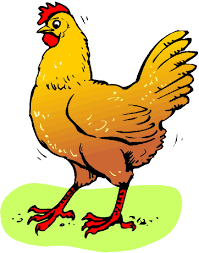
“I have another, almost very constant thought of Cologne, too. When we were shelling that railroad bridge I went looking for a chicken, or eggs, or potatoes, or onions, or carrots….something to add to our terrible C rations. I was off by myself when a heavy shell came in. I thought it would land some distance away so I didn’t throw myself to the ground. The ground was wet and I didn’t want to go clear to the ground so I bent over near a rock wall. I misjudged the shell. It threw some shrapnels my way. One piece went right between my legs and hit the rock wall…..close. It probably would have hit me if I had hit the ground. So I remember Cologne."
The Big Wooden Door
"Now to get across the Rhine. American troops got lucky. They captured a bridge intact….luck, luck, luck. It would have been like another invasion of Normandy without that luck. After a few days the bridge collapsed but by this time we had several pontoon bridges across. We crossed on a pontoon bridge just to the west of the collapsed bridge…I guess you might say south of the collapsed bridge.
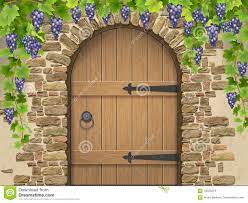
"Then the 981st FA Bn got a bit of good luck. Battery B called to headquarters Battery that they found a big wooden door in the side of a big hill and it was locked and chained and had a sign it belonged to the Nazi party so that meant the boys of Battery B took axes and broke down that door. Inside in a labyrinth of tunnels were thousands and thousands and thousands of cases of beer, wine, and whiskey. The best the Nazis had stolen over all of Europe. Our Colonel said Battery B could take all they could carry without throwing away any equipment and no drunk behaviour tolerated. Then Batteries A and C, and then Headquarters and Service Batteries. We personnel boys took our ¾ ton truck over and loaded up. What a picnic. We had liquor for many months. I found a marvellous liquor that mixed well with the lemon powder always found in C Ration boxes. This drink became our standard cocktail hour drink….thank you, Adolph.
"I found a wooden box that held seven of these bottles and decided to keep the seven bottles for drinking and trading purposes if ever the war ended and I got a furlough to Paris, or somewhere nice, and later I’ll tell you that happened. When American troops first went to England they were paid in English currency. American troops were paid more than British troops [so] American troops really had too much money. We could buy more liquor, buy more dinners in restaurants, buy from goods in British stores, get more attention from British females as a result. Much hard feelings developed.
"So when we invaded Normandy, Uncle Sam changed the whole game. When you got your pay, you got paid as though a French franc was worth two cents. This was a totally unrealistic figure. The French franc was worth much, much less so the pay a soldier got hardly bought anything. Where the American soldier was overpaid in Great Britain he was grossly, grossly underpaid in real purchasing power when the US government said the franc was worth two cents when it was only worth a fraction of that so a big, big, big black market developed. As a non-smoker my cigarettes became priceless and I used them to trade for liquor, eggs, butter, potatoes, onions, etc. I knew I would need something to trade back in some big European city if I ever got there so that is why I saved these seven bottles of good liquor….glad I did."
A Pass to Brussels
"A few days later we stopped. All American troops stopped. Roosevelt decided to let the Russians take Berlin. We could have taken it easily but higher politics gave away this important real estate to the Communists. [^2]
"An order came down that twenty sergeants could get a three-day pass to Brussels. I was lucky. My name was drawn. The next morning a jeep took me and two other sergeants from Headquarters Battery to the rendezvous with the others. The Colonel saw us. What were we doing there? This trip was for battery sergeants, not any Headquarter sergeants. After he knew we were innocent of any skullduggery, he let us go, but first he took me to his room in a small farmhouse. In his room were several cases of assorted liquor from that cave near the Remagen bridge. 'Here,' he said, giving me my choice of a bottle, 'You three enjoy this in Brussels. I had to take some liquor away from troops who were getting drunk on duty.'
"I thanked him but said I couldn’t hide this bottle from the others so he said he’d give me more if we wouldn’t drink on the road. I promised we’d have a whale of a drinking party at night on the way to Brussels, and we did. We stopped at a roadside tavern, got the owner involved with drinking with us and cigarettes and he really dressed up our C rations with eggs, butter, potatoes and onions.
"I told my two companions about my seven bottles of good liquor. We all wanted to trade our cigarettes, our candy, our gum, our soap, and our liquor for the best meals we could find. We took the liquor to a bank in Brussels for safe keeping and to find out where to find a first-rate restaurant. When we were shelling the fort at Dinant I was sent into a little nearby town for liquor, wine, eggs, etc., and we met an Irish lady married to a Brussels banker. He sent his family from Brussels to this small town to avoid the path of the war and got them into the middle of it for a day or two. She got us what we wanted and gave me one of her husband’s business cards. Her husband was away from Brussels when we went into his bank but his personnel at the bank were most helpful. We took three bottles with us and left four at the bank. We went to the restaurant the bank personnel suggested and had a feast. We traded a carton of cigarettes and a bottle of whiskey to the owner for three full course dinners. We tipped the bartender and our waiter with similar items. What a feast! The next night we duplicated the experience using the remaining four bottles.
And a trip to Paris
"When the war was over and when we finally got to a last camp before going home, Camp Lucky Strike, we got detained from going home because the East Coast Teamster Union went on strike. Just a few of us from the 981st were left together, one was the Colonel.
"One Friday afternoon he said, 'I’ve got a jeep. Pick two other sergeants and let’s go to Paris.'
I said, 'Great. What about ration cards?'
'We’ve got hundreds,' he said, 'take plenty.'
I did.
"These ration cards were good for the week you were in, the week past, and the week ahead. Paris had four FXs. We could really stock up. The ration cards had A coupons, B coupons, C coupons, etc. I think A’s were for cartons of cigarettes, bottles of wine, silk stockings, etc. B coupons [were for] candy, gum, mints, etc. And coupons for soap, wash towels, wash rangs, etc, a big selection. Remember, your 2-cent French francs were almost worthless. You had to have barter.
"The Colonel was staying at one of the beautiful Paris hotels and said he didn’t need any barter. We took the jeep and said we’d be back in two or three hours to make sure. Good we went back. He wanted a few more ration cards too. We used our barter for meals, floor shows, and in liquor stores. We developed a test for 3 Star Hennessy. I’ve often wondered if the liquor store owner thought we were dumb Americans. We had no idea of how many cigarettes we should trade for a bottle of 3 Star Hennessy but we traded freely because we wanted to have liquor back at Camp Lucky Strike, somebody made a mistake and gave double our number. I asked the Colonel what I should do. He said, “Keep them. Let any reliable 981st veteran have an extra book if he needs it. They earned it.” So that made five trips to Paris very enjoyable.
Always Looking for Necessities
"Life had its good moments and its bad moments. Life in England before the invasion was rather pleasant….not army life…the civilian life. I got to Bournemouth on the southern edge of England about every weekend. It was fun to go to the English movies, sit in an English tea house and have tea and cookies, or go to the big Bournemouth dance hall and have two English non-coms do our sewing. I met these two girls as they sat in the dance hall and sewed on patches, repairing tears in shirts, pants, etc. They did this for cigarettes and beer and a little change. Soon I was taking in items each week. Mr. Woods had something. Major Stewart had something. Captain Black had something. That’s why I got a pass each weekend. It was a little less than a hour’s train trip from our camp to Bournemouth and this was a nice trip. Nice to get away from army food."
Here are some battles that Bill experienced:
- Normandy June 6, 1944
- The Battle of Cherbourg June 18, 1944
- Battle of the Hedgerows and Bttle of Saint Lo July 7-19, 1944
- Battle of the Falaise Pocket August 11-21, 1944
- Battle of the Hurtgen Forest September 19 - December 6, 1944
- The Fall of Aachen October 2-21, 1944
- Battle of the Bulge December 15, 1944 - January 25, 1945
Or return to Main Page to check out other battles, other stories. (This page last updated on August 2, 2025.)
-
These three dots behave exactly like a footnote. Click on them and you will get more information about the topic. ↩︎